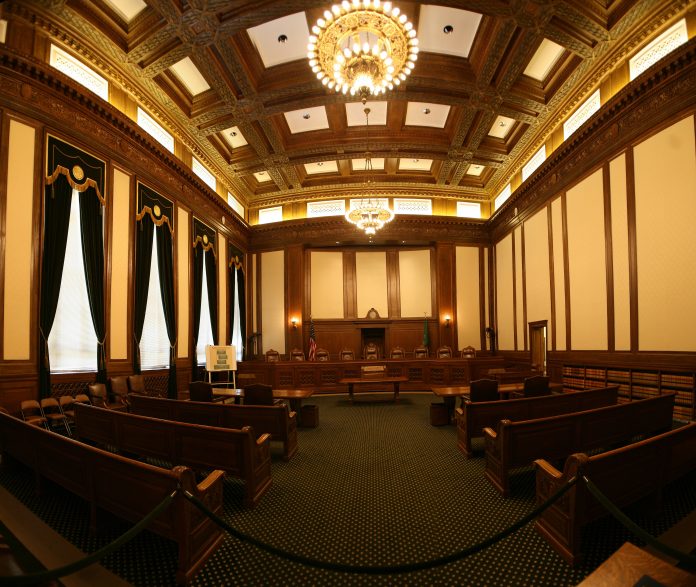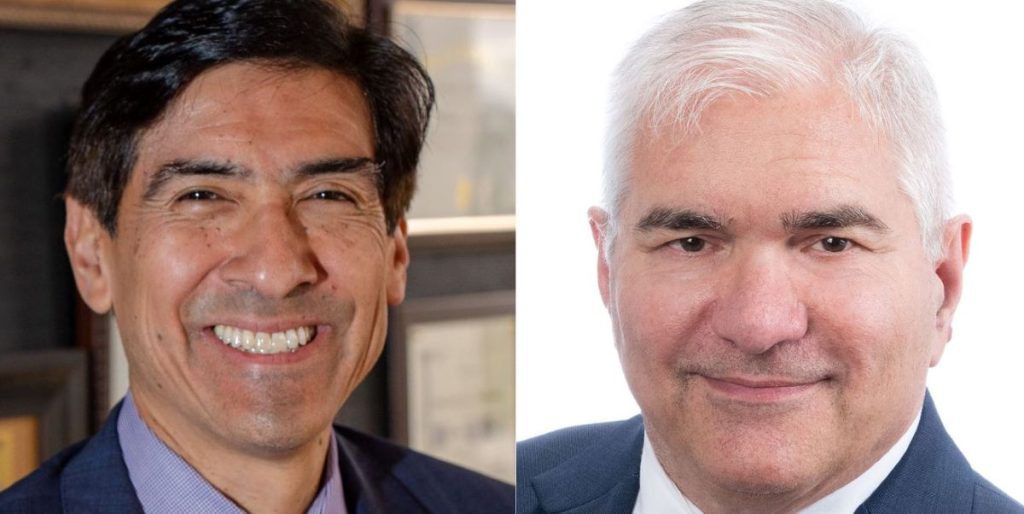
Donald Trump will put new pressure on Washington’s courts. Our judges will have to choose between articulating a populist, egalitarian legal philosophy or embracing lawlessness. A new dark-money group, Full Court Press, has emerged to pack Washington’s courts — the latest step in a long-term national trend.
Dark money may succeed. Troublingly, Washington voters almost picked Dave Larson – a dark-money-backed conservative opposed to our popular capital gains tax – as our newest state Supreme Court justice. Larson’s opponent, Sal Mungia, won by less than 1%.
Why? Obvious explanations include candidate quality — first-time candidate Mungia was, understandably, less effective on the stump — lack of media coverage, and Democratic resources being spread thin covering critical local, state, and federal races. But Larson’s near-victory is also a warning sign for Washington’s legal establishment.
Throughout his campaign, Larson emphasized ordinary Washingtonians’ alienation from our opaque, inefficient, and unjust court system. Larson didn’t campaign as a conservative: he presented himself, inaccurately, as an independent, experienced, and moderate populist outsider. Larson proposed specific, common-sense solutions to long-festering problems, from drug treatment access to jury diversity. He effectively presented his opponent as the hand-picked ally of complacent legal elites.

Washington’s justices will probably try to hand-pick another colleague when Justice Charles Johnson retires in 2027 — giving Full Court Press’ wealthy backers another chance to install a compliant justice like Larson.
Larson ran as a reformist outsider
An experienced candidate running his third state-level campaign, Larson skillfully combined reformist policies with subtle conservative dog whistles. His Soundside interview was the perfect distillation of his superficially progressive messaging: he spoke passionately about increasing jury diversity (without endorsing increased juror pay), endorsed increased drug treatment (but wanted the State to prosecute drug possession), called public defense “one of the most noble things a lawyer can do” (but didn’t support reducing brutal defender workloads), and urged the Court to defer to legislators (unless the Legislature taxes the rich).
Larson capped his interview with effective political jujitsu: turning Mungia’s overwhelming endorsement advantage into a weakness. Larson described Mungia, endorsed by eight of the nine serving justices, as “someone the justices want,” before describing himself as “someone the people need.” Larson finished his interview by arguing that Washington’s current legal system makes people feel powerless and disenfranchised, and that courts needed to emphasize treating people with dignity and respect.

Larson’s right. Washington’s civil and criminal legal systems are opaque, inaccessible, and unjust. A 2015 Washington Supreme Court study found that 70% of low-income households experienced a serious civil legal problem in the last year; three quarters of these households never received the legal help they needed. Nearly 10 years later, the Court has made little, if any, progress addressing this problem. Even middle-class Americans can’t afford an attorney. There aren’t any free attorneys available either. The Court allowed Washington’s public defense system, in crisis since at least 2004, to finally collapse — delaying justice for everyone.
Larson also benefited from limited media scrutiny. The few news outlets who covered the Supreme Court race–from KUOW to local newspapers–never asked probing questions about his contradictory messages or the rich extremists running his campaign. The decline in local media means fewer resources to cover the courts, ensuring few reporters understand the legal system well enough to question judicial candidates and inform voters. Unsurprisingly, many voters knew almost nothing about Larson or Mungia.
Washington’s highest court needs genuinely independent outsiders
Washington’s Democratic establishment, stung by Mungia’s narrow victory, may be tempted to handpick a more traditional candidate — like a corporate-lawyer-turned-judge with some pro bono experience — to fill retiring Justice Johnson’s seat in 2027 or retiring Justice Madsen’s seat in 2029. Mungia, unlike Larson, had never been a judge and had not run for office before. And perhaps voters punished Mungia for the Court’s perceived progressive excesses, like the Blake decision declaring Washington’s unusually harsh drug laws unconstitutional.
Handpicking any candidate, let alone one with a corporate background, would be a huge mistake. There’s no evidence that voters almost chose Larson over Mungia because of the Court’s perceived progressivism; Justice Raquel Montoya-Lewis, one of the Court’s most consistently egalitarian voices, easily defeated Larson in 2020, and voters convincingly backed the capital gains tax that the Court cautiously upheld. Mungia’s lack of judicial experience also doesn’t explain his narrow win: in 2012, Justice Sheryl Gordon-McCloud easily defeated a conservative opponent — and experienced judge — despite having no judicial experience herself.
Running a cautious corporate moderate won’t address Larson’s real source of support: his independent, reformist, outsider message. Larson used Washingtonians’ distrust of our state’s inaccessible court system to turn Mungia’s strong institutional backing into a political liability, even though Larson’s wealthy, dark-money backers had no interest in creating just courts.
The only way to prevent wealthy conservatives from installing their preferred justices in 2027 and 2029 is for Washington Democrats to back outsider candidates committed to Washington’s populist, egalitarian constitution. These candidates will need to energetically campaign and articulate a strong, values-based message. While Larson has argued that judges’ values are irrelevant because they should simply apply the law as written, this is a red herring. Judges resolve disputes, of course, but Washington’s Supreme Court Justices also act as legislators: they make binding legal rules. These rules determine everything from who gets to be a lawyer – and how – to which defendants get released from pre-trial detention.
Washington needs justices willing to use their rule-making powers to make our courts fairer and more accessible. Thankfully, we have a deep bench, including ACLU-WA Executive Director Michele Storms, Seattle University Dean Anthony Varona, or even former Northwest Immigrant Rights’ Project Director — and current King County Councilmember — Jorge Baron.
Larson’s near-win proved that Washington’s legal establishment faces a serious legitimacy crisis. Running another hand-picked corporate candidate won’t help, but a genuine reformer can — and will — win.

Austin Field (Guest Contributor)
Austin Field is a combat veteran, an attorney, and a resident of Washington’s 9th Congressional District. The views expressed are his own.
